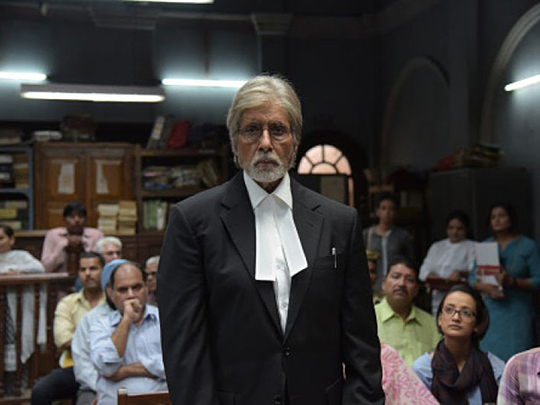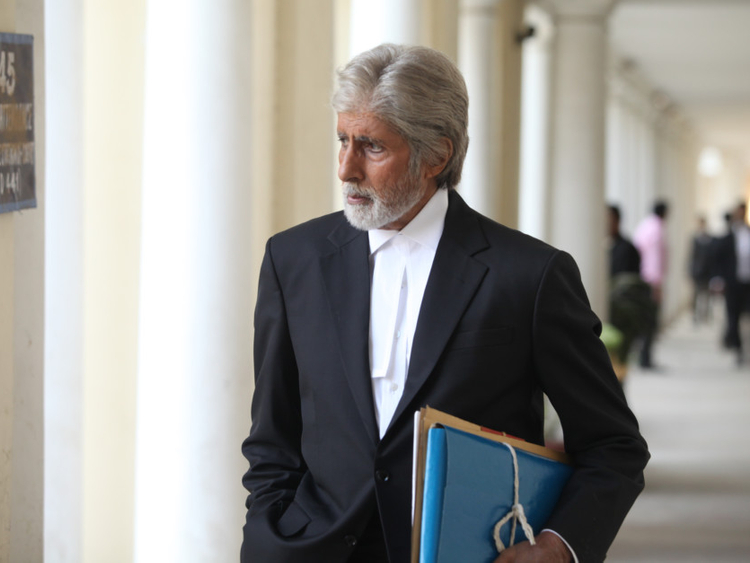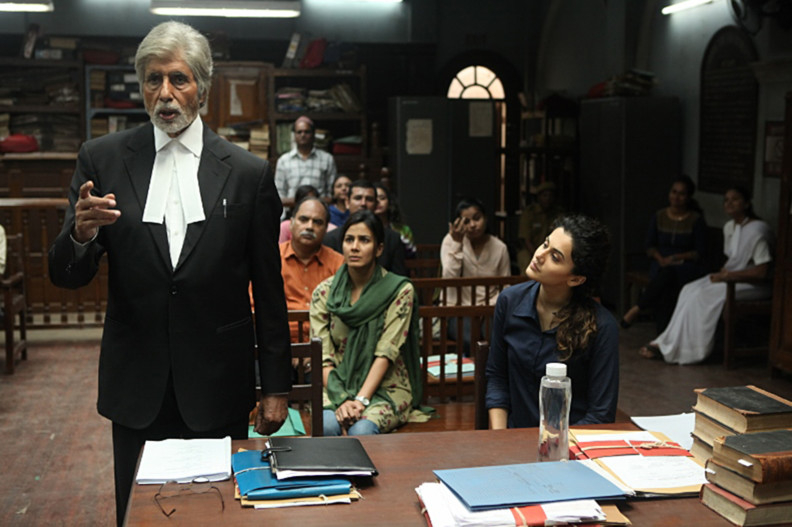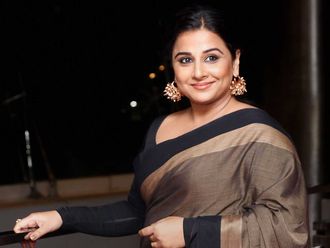
The verdict is out on Pink.
The thriller, starring Taapsee Pannu, Kirti Kulhari, Andrea Tariang and Amitabh Bachchan, has been unanimously loved by critics and the audience for its searing portrayal of women who swat sexual harassment.
Ever since its release in the UAE last Thursday, the tale of three single women working in Delhi who take on a group of entitled, well-connected men has been hailed as one of the most important films to be made in Bollywood this year. It takes a swipe at the rampant male privilege that exists in India and how Indian society is quick to take down so-called “modern, independent working women”.
Its creative producer Shoojit Sircar already had a premonition about how potent the material is.
“The story was impactful when I heard it and the film was instantly relatable. The points of view that the story touches upon would trigger discussion and debate. There was a conscious attempt to tell the story in a way that somebody can go back and debate or discuss how the society perceives things,” Sircar says. The Piku director wasn’t wrong. Dialogues about how the length of a woman’s skirt doesn’t determine her morality, and about what constitutes sexual consent hit home... hard.
While actress Pannu, Kulhari and Tariang were outstanding in their roles as women who go on trial for attempted murder and solicitation, the legendary actor Amitabh Bachchan lent his baritone and weight behind this film.
While Sircar jokes that he has signed a “friendship deal” with Bachchan — who also starred in the acclaimed Pink — the icon claims that the concept of the film intrigued him.
Here are excerpts from our e-mail interview with Bachchan.
Pink is a tale of three independent women and how a violent episode affects their life. What would you say to women who fight stereotypes and witch-hunting every day?
Be strong, be aware of what goes on about you, and take adequate precaution. At the same time our systems should be in place to give respect and dignity to women, who I have always believed to be 50 per cent the strength of a nation or society. Their dignity and their equality must be given due place.
Recently, you wrote a powerful letter to your granddaughters about what it is to be a woman and telling them not to let society dictate their choices. What compelled you to write it?
During the several interviews that we were doing with the media for the film, a question that was repeatedly asked of us was what the film was about. It was not possible to explain that without letting the story out, so Shoojit felt that maybe if we were to put out the essence of the film through a letter that I would write to my granddaughters, we would be able to convey not just a strong message but give the audience a justifiable answer. We agreed to write those words, and [an English daily in India] was willing to publish it and that is how it came about.
Gender neutrality is what we aspire for. When did you become aware that being a male in Indian society is a privilege?
For me being a human is a privilege. I never ever felt the need to be aware of any else.
Violence against women, especially sexual violence, in India is a burning issue. What is the way forward?
I wish I could give you a concrete answer. We have to keep addressing the issue, educating the masses, bringing in punishable laws and continue to be a constructive part in spreading valuable meaningful messages. I hope that the film Pink awakens some sentiment in this direction.
How would you define women’s empowerment in terms of your reality and life?
Women’s empowerment is a long discourse and has varied opinions. I would not like to get into that just yet. But I have certain beliefs on what I think about women in society and the morals that are associated with it. Realities of life [for women] have... undergone impressive and severe changes. I would wish that it continues to mend the ways we treat our women. They are half the strength of a nation. They deserve that position without compromise.
As a father to [actor] Abhishek Bachchan, how did you explain the concept of gender equality?
Abhishek never needed to be explained the concept of gender equality. He grew up with an elder sister and several cousin sisters, and parents who never believed in that inequality, as [did] his grand parents.
What about the role in Pink appealed to you?
I heard the concept of the film first from Shoojit Sircar and without asking what my role or story would be, I agreed to do the film. The role of the lawyer is no different from any other. When you play such roles there will be court room drama and this one was just that. How he conducts himself in the film and what the results are shall be known once you watch Pink.
You appear ruthless in the courtroom and some reports claim that you have bipolar disorder. Were you anxious about the way mental health is depicted in Hindi films?
The bipolar illness is a mere back story and we have not dwelled on it as a major factor in the story. But yes, mental health needs to be depicted with the right sentiments, and it’s difficult to play such characters.
The makers of Pink are determined to clarify that Pink isn’t a film about rape or women’s empowerment. Is it the fear of alienating audiences that compel producers to underline that disclaimer?
As far as I know the makers did not make any claim on the nature or the quality of the issues you ask. It is just that during our various interviews these were the kind of questions that were coming our way. So we needed to clarify it in order that our point and point of view of the story does not get misunderstood. It is not [in capital letters] a film on women empowerment or rape. It is a discourse on women and their standing in society. The film does not want to make any laws or make firm positive or negative statements. It is a social thriller, an entertaining film, which yes, has given us an opportunity to bring in several beliefs that as makers the director and all of us recognised.
Do you think capital punishment is apt for rapists who commit gruesome acts of violence against the victim?
We have just had a judgment on an incident of acid attack, where the convicted has been given the strongest punishment. Each one of us will have different views. I am not a law maker, nor one that sits on the official judicial system. I believe there are sufficient legal and moral brains in the country to come to some justifiable solution.
What did you learn from young actors such as Taapsee Pannu?
I learnt that they are a very talented and extraordinary generation of artists, for whom I have the greatest respect and admiration.
Don’t miss it!
Pink is currently showing in the UAE.














